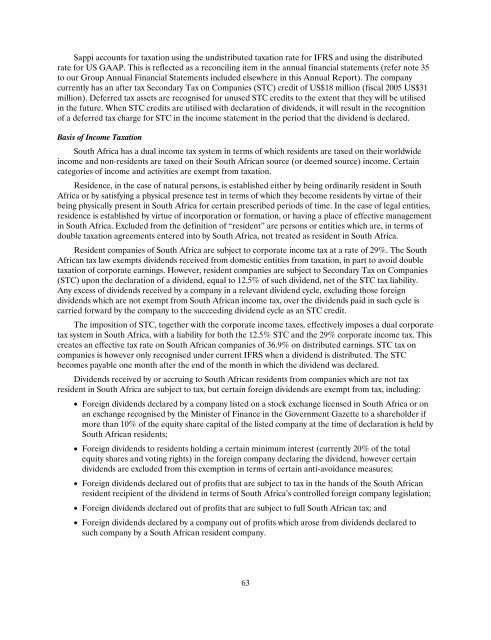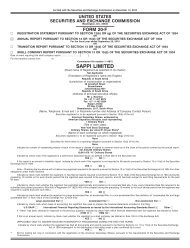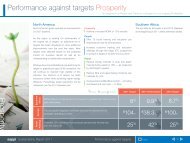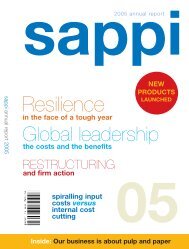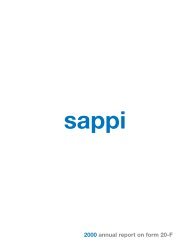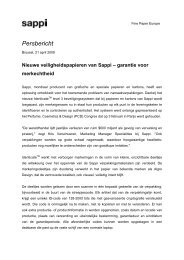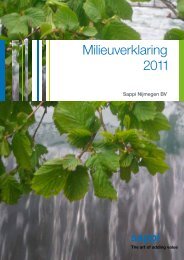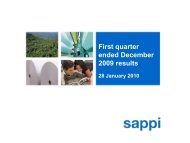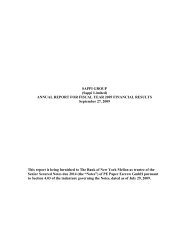You also want an ePaper? Increase the reach of your titles
YUMPU automatically turns print PDFs into web optimized ePapers that Google loves.
<strong>Sappi</strong> accounts for taxation using the undistributed taxation rate for IFRS and using the distributed<br />
rate for US GAAP. This is reflected as a reconciling item in the annual financial statements (refer note 35<br />
to our Group Annual Financial Statements included elsewhere in this Annual Report). The company<br />
currently has an after tax Secondary Tax on Companies (STC) credit of US$18 million (fiscal <strong>20</strong>05 US$31<br />
million). Deferred tax assets are recognised for unused STC credits to the extent that they will be utilised<br />
in the future. When STC credits are utilised with declaration of dividends, it will result in the recognition<br />
of a deferred tax charge for STC in the income statement in the period that the dividend is declared.<br />
Basis of Income Taxation<br />
South Africa has a dual income tax system in terms of which residents are taxed on their worldwide<br />
income and non-residents are taxed on their South African source (or deemed source) income. Certain<br />
categories of income and activities are exempt from taxation.<br />
Residence, in the case of natural persons, is established either by being ordinarily resident in South<br />
Africa or by satisfying a physical presence test in terms of which they become residents by virtue of their<br />
being physically present in South Africa for certain prescribed periods of time. In the case of legal entities,<br />
residence is established by virtue of incorporation or formation, or having a place of effective management<br />
in South Africa. Excluded from the definition of “resident” are persons or entities which are, in terms of<br />
double taxation agreements entered into by South Africa, not treated as resident in South Africa.<br />
Resident companies of South Africa are subject to corporate income tax at a rate of 29%. The South<br />
African tax law exempts dividends received from domestic entities from taxation, in part to avoid double<br />
taxation of corporate earnings. However, resident companies are subject to Secondary Tax on Companies<br />
(STC) upon the declaration of a dividend, equal to 12.5% of such dividend, net of the STC tax liability.<br />
Any excess of dividends received by a company in a relevant dividend cycle, excluding those foreign<br />
dividends which are not exempt from South African income tax, over the dividends paid in such cycle is<br />
carried forward by the company to the succeeding dividend cycle as an STC credit.<br />
The imposition of STC, together with the corporate income taxes, effectively imposes a dual corporate<br />
tax system in South Africa, with a liability for both the 12.5% STC and the 29% corporate income tax. This<br />
creates an effective tax rate on South African companies of 36.9% on distributed earnings. STC tax on<br />
companies is however only recognised under current IFRS when a dividend is distributed. The STC<br />
becomes payable one month after the end of the month in which the dividend was declared.<br />
Dividends received by or accruing to South African residents from companies which are not tax<br />
resident in South Africa are subject to tax, but certain foreign dividends are exempt from tax, including:<br />
• Foreign dividends declared by a company listed on a stock exchange licensed in South Africa or on<br />
an exchange recognised by the Minister of Finance in the Government Gazette to a shareholder if<br />
more than 10% of the equity share capital of the listed company at the time of declaration is held by<br />
South African residents;<br />
• Foreign dividends to residents holding a certain minimum interest (currently <strong>20</strong>% of the total<br />
equity shares and voting rights) in the foreign company declaring the dividend, however certain<br />
dividends are excluded from this exemption in terms of certain anti-avoidance measures;<br />
• Foreign dividends declared out of profits that are subject to tax in the hands of the South African<br />
resident recipient of the dividend in terms of South Africa’s controlled foreign company legislation;<br />
• Foreign dividends declared out of profits that are subject to full South African tax; and<br />
• Foreign dividends declared by a company out of profits which arose from dividends declared to<br />
such company by a South African resident company.<br />
63


